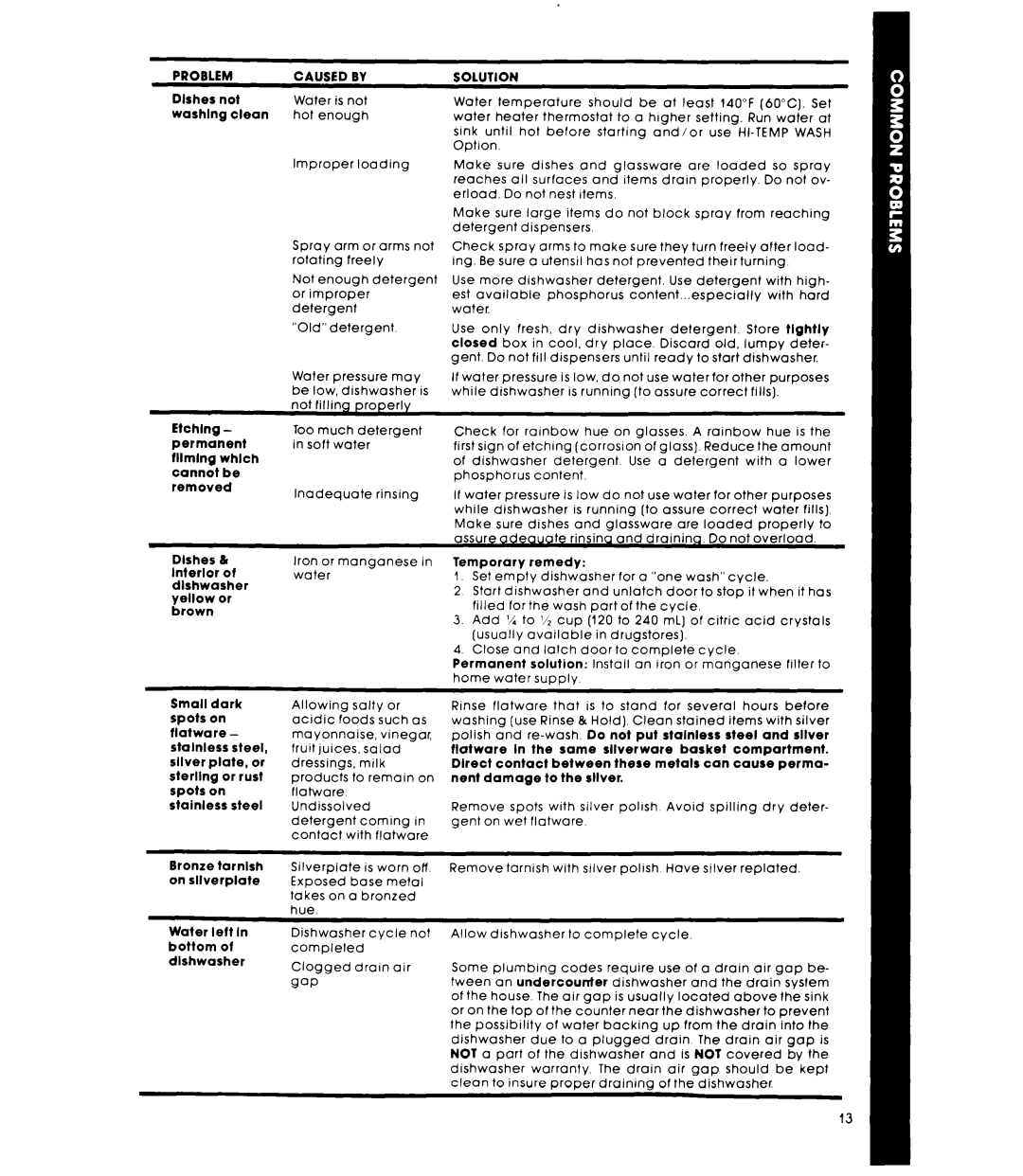
PROBLEM
Dishes not washlng clean
Etching - permanent tllmlng which cannot be removed
Dishes & lnterlor of dlshwasher
Small dark spots on flatware - stalnless steel, sliver plate, or sterling or rust spots on stainless steel
Bronze tarnlsh on sllverplate
Water left In bottom of dlshwasher
CAUSED BY
Water is not hot enough
Improper loading
Spray arm or arms not rotating freely
Not enough detergent or improper
detergent
“0ld”detergent.
Water pressure may be low, dishwasher is
TOOmuch detergent in soft water
Inadequate rinsing
Iron or manganese in water
Allowing salty or acidic foods such as
mayonnaise, vinegar, fruit juices, salad dressings, milk products to remain on flatware.
Undissolved
detergent coming in contact with flatware
Silverplate is worn off. Exposed base metal takes on a bronzed
Dishwasher cycle not completed
Clogged drain air gap
SOLUTION
Water temperature should be at least 140°F (6O”CJ. Set water heater thermostat to a higher setting. Run water at
sink until hot before starting and/or use
Make sure dishes and glassware are loaded so spray reaches all surfaces and items drain properly. Do not ov- erload. Do not nest Items.
Make sure large items do not block spray from reaching detergent dispensers.
Check spray arms to make sure they turn freely after load- ing. Be sure a utensil has not prevented their turning.
Use more dishwasher detergent. Use detergent with high-
est available phosphorus content...especially with hard water
Use only fresh, dry dishwasher detergent. Store tightly closed box in cool, dry place. Discard old, lumpy deter- gent. Do not fill dispensers until ready to start dishwasher.
If water pressure is low, do not use water for other purposes while dishwasher is running (to assure correct fills].
Check for ratnbow hue on glasses. A rainbow hue is the first sign of etching (corrosron of glass). Reduce the amount
of dishwasher detergent. Use a detergent with a lower phosphorus content.
If water pressure is low do not use water for other purposes
while dishwasher IS running (to assure correct water fills]. Make sure dishes and glassware are loaded properly to
assure adeauate rinsina and draininq. Do not overload.
Temporary remedy:
I. Set empty dishwasher for a “one wash” cycle.
2 Start dishwasher and unlatch door to stop it when it has filled for the wash part of the cycle.
3.Add l/4 to % cup (120 to 240 ml] of citric acid crystals
(usually available in drugstores).
4.Close and latch door to complete cycle.
Permanent solution: Install an iron or manganese filter to home water supply
Rinse flatware that is to stand for several hours before washing [use Rinse & Hold). Clean stained items with silver polish and
flatware In the same sllverware basket compartment. Direct contact between these metals can cause perma- nent damage to the sliver.
Remove spots with silver polish Avoid spilling dry deter- gent on wet flatware
Remove tarnish with silver polish Have silver replated
Allow dishwasher to complete cycle.
Some plumbing codes require use of a drain air gap be-
tween an undercounter dishwasher and the drain system of the house. The air gap is usually located above the sink or on the top of the counter near the dishwasher to prevent the possibility of water backing up from the drain into the
dishwasher due to a plugged drain The drain air gap is
NOT a part of the dishwasher and is NOT covered by the
dishwasher warranty. The drain air gap should be kept clean to insure proper drainina of the dishwasher.
13
